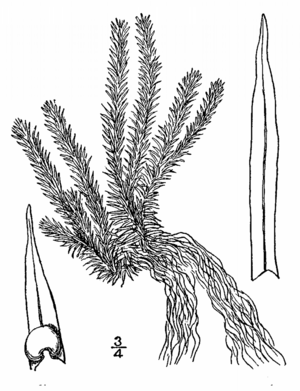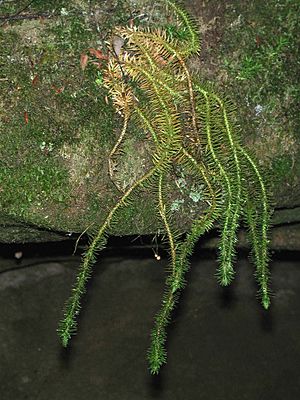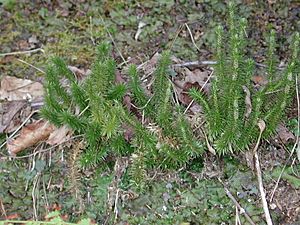Rock clubmoss facts for kids
Quick facts for kids Rock firmoss |
|
|---|---|
 |
|
| 1913 illustration | |
| Conservation status | |
| Scientific classification | |
| Genus: |
Huperzia
|
| Species: |
porophila
|
| Synonyms | |
|
|
The rock firmoss, also known as rock clubmoss (scientific name: Huperzia porophila), is a small plant found in North America. It grows mainly in the Appalachian Mountains area of the Eastern United States and central Canada. You can find it from Ontario in the north, all the way south to Georgia and Alabama. It is not very common east of the Appalachian Mountains. It is most often seen in a long strip from north to south along the western plateau.
Contents
What is Rock Firmoss?
The rock firmoss is a type of plant that loves to grow on rocks. It needs places that are cool, wet, shady, and have acidic soil or rock. It looks very pretty when it grows over large rocks and rocky areas.
How to Spot Rock Firmoss
People often mix up the rock firmoss with another plant called the shining firmoss (Huperzia lucidula). Both plants often grow on rocks in the same areas. However, there are a few ways to tell them apart:
- The leaves of the rock firmoss are usually 3 to 8 millimeters long. They are generally not shiny. The shining firmoss usually has shinier leaves.
- The stems of the rock firmoss grow upwards and are about 12 to 15 centimeters tall. They usually do not have many branches.
- Unlike the shining firmoss, the rock firmoss grows as single plants. It does not form thick groups or colonies.
A great place to see this plant is in the Hocking Hills area of southeast Ohio.
How Rock Firmoss Came to Be
The rock firmoss is a special plant because it formed from two other plants. It is a hybrid plant. This means it was created when two different parent plants mixed their genes. Its parents are the Huperzia lucidula and Huperzia selago.
Hybrids and Reproduction
The rock firmoss (H. porophila) can also mix with the shining firmoss (H. lucidula). When they do, they create a new plant called H. × bartleyi. This new plant is sterile, which means it cannot have its own babies (seeds or spores).




